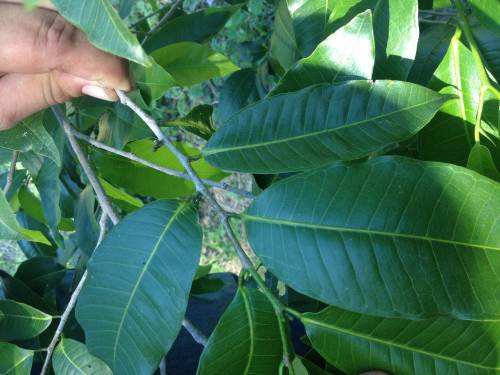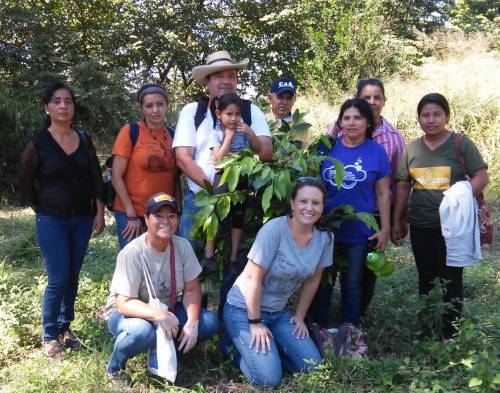A letter from Kristi Van Nostran serving in El Salvador
December 30, 2015
Write to Kristi Van Nostran
Individuals: Give online to E200479 forKristi Van Nostran’s sending and support
Congregations: Give to D507545for Kristi Van Nostran’s sending and support
Churches are asked to send donations through your congregation’s normal receiving site (this is usually your presbytery).
In the early morning light there we were already bumping down the road in the back of the pickup. As we sped through clouds of dust, I wondered if the driver hadn’t forgotten the precious cargo in the bed of the truck. Everyone was excited to be joining our partner communities in the Lower Lempa River valley at a public forum to announce the approval of a municipal ordinance to further regulate the practices used in the production of sugarcane.
Fighting the noise of the road, the folks from San Isidro, San Luis Talpa, and Nahuilingo chatted enthusiastically about what it would mean if an ordinance like this one could be enacted in their communities. What if aerial spraying of agrochemicals were restricted; what if three-day’s notice to all the neighbors were required before burning the cane fields; what if water use for irrigation were limited to protect the supply for the surrounding communities? Spirits and hopes were high as they discussed the potential for replicating this kind of community-driven action in their own towns. As we pulled into the lot, dusty and wind-blown, everyone was anxious to celebrate this first step in a much larger struggle toward healthier and more sustainable agriculture in El Salvador. Upon our arrival, we found out that the forum had been postponed.
A child is born to us! A son is given to us! And he will be our ruler. He will be called, “Wonderful Counselor,” “Mighty God,” “Eternal Father,” “Prince of Peace.” Isaiah 9:6

Budding ojushte nuts on a young grafted tree
What a letdown! After traveling all that way, and with such high hopes and expectations. Everyone was very understanding, but I could tell by the looks on their faces that they were disappointed…
As we read the prophet Isaiah’s foretelling of the coming of the Messiah, it is hard not to anticipate greatness: a mighty ruler with the influence and authority to liberate a people from “the yoke that burdened them and the rod that beat their shoulders” (9:3), a powerful warrior who will defeat the nations that oppress and exploit his people (9:4), a celebrated ruler of royal lineage, whose vast kingdom will always enjoy peace (9:7). Now that the long-awaited Savior has arrived, I think it’s safe to assume that more than a few people of the time were disappointed—at best—by the tenuous circumstances surrounding the Christ-child’s birth. Wrapped in swaddling clothes and lying in a manger, born to a poor, young woman, wife of a carpenter. Just days old and already on King Herod’s most-wanted list, sending his family fleeing for their lives. This is nothing like the king we were promised!
Where is the pomp, where is the spectacle? Where is the proof of his authority to rule? Where are the symbols of his power; wealth, weapons, wise counsel? I’m afraid many of us are still asking these questions today. We’re disappointed that shepherds and barn animals and magi from the East—outsiders—were the first to welcome our Lord into the world. In our frustration and confusion, we have led ourselves to believe that the bigger and brighter we celebrate Christmas, the more we can class up the arrival of this humble child, the more likely we will be to convince those who put their faith in power and prestige as the world defines them that this is indeed the One who will be called Wonderful Counselor, Mighty God, Prince of Peace. Perhaps we can even convince ourselves…

RUMES visitors with University of El Salvador partners at the experimental farm
So, after making the hours-long, early morning trek across the country, our group decided to head back and try to salvage what was left of the day. Since we were in the area, the group agreed that we would drop in unannounced at the University of El Salvador’s experimental farm, where some Joining Hands El Salvador (RUMES) members have been doing field studies. It was a bit of a long shot, showing up unexpected. But sure enough, our friends were there, and not only did they welcome us in, but they dropped what they were doing to give us a tour of the farm.
They were practically giddy as they led us straight into a grove of young trees. Sonia, our partner working with ManáOjushte, and University of El Salvador Professor Fidel were finishing each other’s sentences, they were so excited to have someone with whom to share the incredible news in person. The trees that surrounded us were the first in an experimental program to graft branches from mature ojushte trees to saplings grown from ojushte seed. The ojushte, or Maya nut, is a native and ancestral tree whose nuts are packed with protein and other essential vitamins and minerals and once played a vital role in the diet of the Mayan peoples indigenous to Central America. If the grafting experiment is successful, they told us, it would mean that ojushte trees that naturally bear fruit between seven to ten years could begin producing, and local communities could begin to enjoy the benefits of this nutritious food, in as few as three years.
We were invited to look closely at the branches of these two-and-a-half-year-old trees, and there amidst the bold, green leaves we caught a glimpse of the joyous news our friends were so eager to share: the tiny buds that would grow into the healthy and hearty ojushte nuts that could eventually provide nourishment for an entire village! It was truly amazing and inspiring to witness, and our random group of folks, in an unplanned and unexpected visit, were the first to behold the blessed happening. No pomp, no spectacle. But from humble beginnings filled with potential blossoms the realization of big dreams and the answer to the prayers of many.
The prophet Isaiah foretold: Just as new branches sprout from a stump, so a new king will arise from among David’s descendants (11:1). Though it may not be the way we imagined, or planned, or expected, Christ has come! May we always look for the blessings in the unexpected. Amen.
Your faithful support through prayers, visits, advocacy and financial gifts continues to be a blessing to me and to our sisters and brothers in El Salvador. My heartfelt thanks for journeying with us in mission throughout 2015. If you don’t do so already, I invite you to consider providing financial support for my ministry in 2016. I invite you to accompany us into a new year filled with successes and challenges, and unexpected blessings.
Gratefully,
Kristi
The 2015 Presbyterian Mission Yearbook for Prayer & Study, p. 69
![]() You may freely reuse and distribute this article in its entirety for non-commercial purposes in any medium. Please include author attribution, photography credits, and a link to the original article. This work is licensed under a Creative Commons Attribution-NonCommercial-NoDeratives 4.0 International License.
You may freely reuse and distribute this article in its entirety for non-commercial purposes in any medium. Please include author attribution, photography credits, and a link to the original article. This work is licensed under a Creative Commons Attribution-NonCommercial-NoDeratives 4.0 International License.